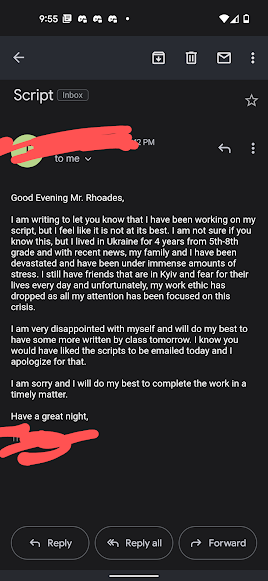Listening: Now more than ever, we need to listen
I was going to sit down and play some Elden Ring because I am kind of obsessed with it (read: seriously obsessed), but then two things happened in very quick succession that seemed to be random but was obviously similar. Twin Peaks, and Agent Cooper, taught me that when this happens the universe is speaking. The question is when moments like this happen, are we listening?
When students talk - are we listening?
- COVID-19 and the death of 5.94 million people worldwide and nearly a million in this country alone
- The racial uprising following the murder of George Floyd
- The intersection on the capital building
- The invasion of Ukraine by Russia
- The possibility of a third World War
Students shouldn't have to show us their trauma in order for us to be understanding. How many other students do I teach who aren't speaking out and advocating for themselves right now with what they need? How many other students are experiencing more localized forms of trauma that simply outstrip their ability to "do school?"
I have to ask myself:
- What am I doing to be understanding (as a verb AND a noun)?
- How have I communicated this with students?
- Do I have a policy where students can submit work later without having to explain their tardiness with assignments?
- Have I told students that I care about them regardless of their work?
- Have I shown them this with actions?
My county, like many others following the CDC guidelines, has just announced that we will be mask-optional starting tomorrow. I wonder about the safety my students will be seeking and what they will find. I wonder about their emotional well-being.
At almost the same time, I had another conversation with a student on Remind:
At first, you can tell that I wasn't doing the best job of listening. We have to wrap up this argumentative writing unit this week, and student writing time (which is normally sacred anyhoot) is now being pressured to stay in synch with our testing calendar. There are many reasons we don't do the best job listening to our students. Testing pressures and standardized testing culture normalize a lot of bad habits in teaching that of course bleed over into bad habits in relationships. Of course, I don't believe you can actually separate the two.
I was reminded recently in sitting down with my dissertation committee chair how important listening to kids will be (and is already) for the work I want to do with them for our research. Youth Participatory Action Research (YPAR) requires a culture shift for many educators. I'm hoping to build the framework and classroom culture long before I submit that IRB proposal!
In closing, listen. Listen to the students and find understanding. I don't see the world becoming any safer, calmer, or more reasonable in the coming future - so let's work to make our classrooms and our relationships more meaningful for the students in the room.






Comments
Post a Comment